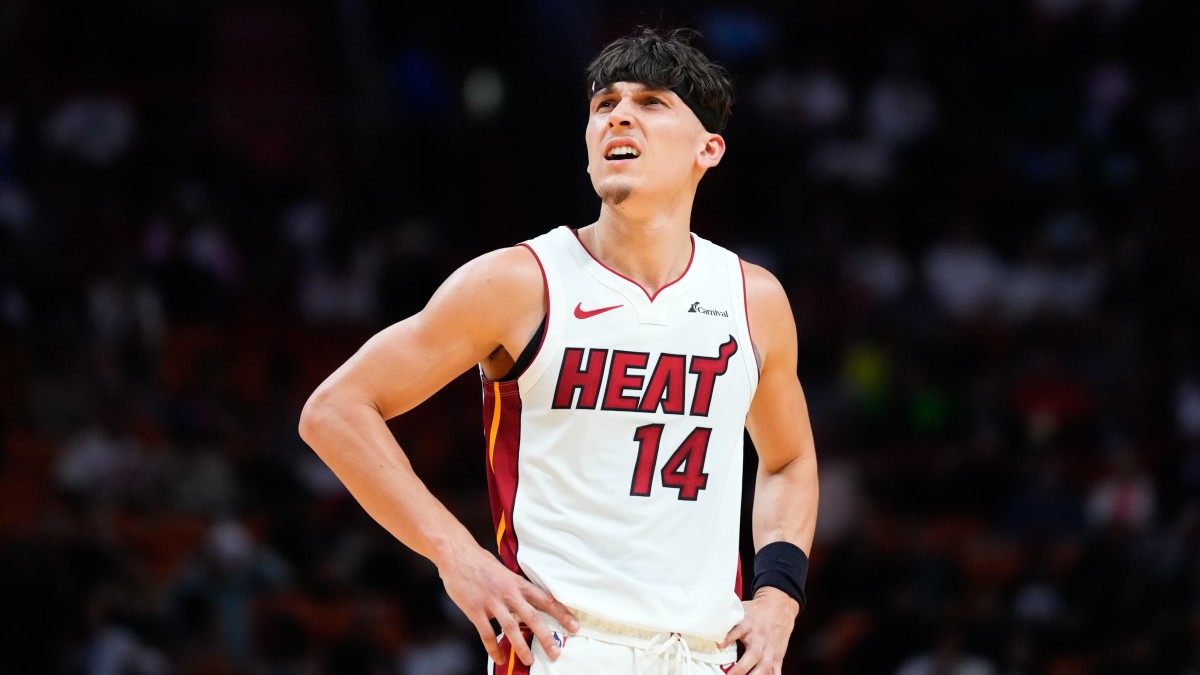Tyler Herro Could Prove to Be the Key for Heat’s Title Chances

It doesn’t take much to reach the conclusion that the Heat haven’t had the greatest summer.
Following a euphoric, underdog run to the Finals, the league’s runner-up lost guard Gabe Vincent to the Lakers on the first day of free agency. The following day, reports surfaced that free agent Max Strus, another key piece of last season’s club, would be headed to the Cavaliers.
Many—the Heat almost certainly included—believed those losses might eventually be softened by the biggest acquisition of all: Upon asking for a trade out of Portland, star floor general Damian Lillard made it known that Miami was the only place he wanted to land. He figured to be a close to perfect fit for a team that sometimes struggles to score for stretches, and has a tendency to lean too heavily on 34-year-old workhorse Jimmy Butler to create offense for it.
As we all saw, the process of landing Lillard wasn’t smooth. After a few days, it became abundantly clear that the Trail Blazers weren’t keen on making the deal if Heat guard Tyler Herro was going to be the centerpiece of their return for Lillard, arguably the best player in Blazers history. With that idea being out in the open, it created an uncomfortable tension with Miami trying to use Herro to upgrade a roster that’s been on the cusp of a championship twice in four years.
There was true frustration over the ordeal, as Herro—who last year got a four-year, $130 million deal from the Heat—had just recently finished moving into a $10.5-million Miami-area mansion in the months that preceded the rumors and trade talks.
Just how uncomfortable was it for someone like Herro? “I didn’t really speak to the Heat all summer, honestly,” Herro told Wes Goldberg of The Ringer.

The one person he really did speak with consistently about it all, according to Goldberg, was recently retired Heat sage Udonis Haslem, who essentially told Herro to come to grips with the fact that he would be another uniform soon. “He wasn’t really trying to butter it up, like, “Oh, you might be coming back. He was like, ‘Yeah, you’re gone. And if you are gone, let’s not, like, feel disappointed,’” Herro recalled.
“I thought I was out of here,” Herro said. “I damn near had my s--- packed up.”
All of which made it surprising (and perhaps a tad awkward) when Herro’s phone kept buzzing nonstop as he had a Sept. 27 lunch with Erik Spoelstra, who figured he might be hanging with Herro for the last time as his coach. The reason for all the notifications: People were reaching out to say Lillard had been traded—but to Milwaukee, not Miami. Herro would be staying put.
There are now two questions that become pressing for Herro and the Heat: First, can the guard get over the mental side of the trade talks—the personal side of it—which he acknowledges made him “feel some type of way”? And secondly, even if he brings the right attitude toward this coming season, can he grow enough as a player—one who contributes more defensively—to where he helps the club not only get back to the Finals, but aids them in doing enough to win it?
It’s clear that Spoelstra is among the league’s best coaches, if not the very best. But losing Vincent and Strus while adding Josh Richardson, Thomas Bryant and rookie Jaime Jaquez Jr. would be a lot for any conference finalist to withstand. The upside is that this all leaves Herro with an opportunity to prove his naysayers—and even the club thatwas prepared to trade him—wrong.
For some, the logic last postseason was that Herro’s absence (caused by a broken hand during the first round that kept him out the rest of the way) allowed Miami to utilize more stout, versatile defenders while also affording Bam Adebayo a greater share of the offensive playmaking. In Herro’s stead, wing Caleb Martin also looked as impressive as he ever has during the series against Boston.
So what happens now that Herro’s back? It won’t surprise anyone if he again averages 20-plus points per game and shoots around 40% from beyond the arc. That’s what he’s shown for the last couple seasons now, along with a bolstered ability to make plays for others. At 23 years old, Herro’s still quite young, so it’s fair to expect he has room to improve on both ends as he continues to learn and be thrown into different scenarios.
His ability to take another sizable step forward, particularly after the Lillard bust, is absolutely critical for the Heat should the roster remain the way it is.
In the past four seasons, Miami’s made three conference finals and reached the NBA Finals twice. But even with Spoelstra’s genius and Miami’s never-say-die belief in itself, it feels like a stretch for the Heat to get that far again unless Herro, fired up from this summer’s happenings, provides the club a lift by playing the best all-around basketball of his life. And given the confidence he holds in himself—”I have the potential to be the best scorer in the NBA at some point,” he told Goldberg—perhaps we’d all be premature in counting him and Miami out just yet.
